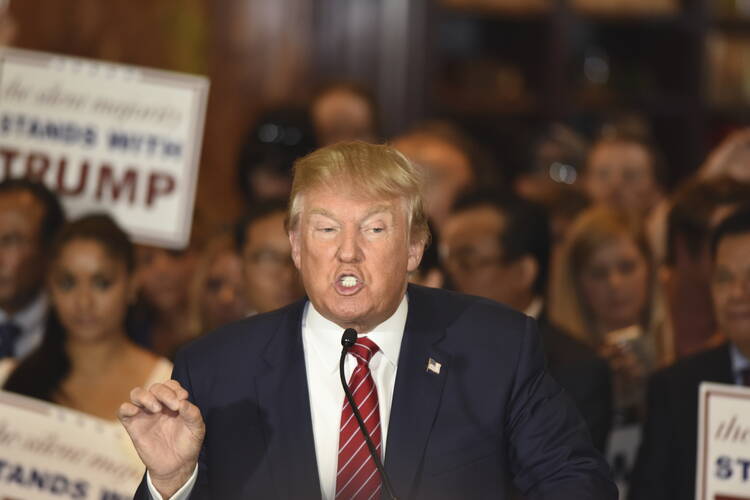Probably the most common insult Americans use against politicians is “phony.” It can apply to anyone who voices opinions different from your own (“deep down, they know I’m right”), but the word is usually hurled against candidates who seem too rehearsed, too conscious of the effects of their words. Political leaders are accused of lacking “authenticity” when they pause and take a breath before reacting to news about a scandal or a tragedy. It seems that the best way to deflect charges of phoniness is to go off half-cocked (“I’d like to kill someone over this!”), even when the bursts of what looks like spontaneity are planned.
We saw a lot of so-called authenticity last year in presidential politics, mostly in the candidacy of the Republican Donald Trump, who dominated news coverage with increasingly divisive rhetoric. Mr. Trump has prospered as a person with no filters on what he says, characterizing immigrants from Mexico as “rapists,” advocating that the the United States “take out” the families of terrorists and suggesting that protesters at his campaign events deserved to be “roughed up.” In an MSNBC poll in December, 43 percent of all voters and 71 percent of Republicans described him as someone who “tells it like it is,” as opposed to someone who “is insulting and offensive.” When Mr. Trump said he would stop all Muslims from immigrating to or visiting the U.S., former Republican vice-presidential nominee Sarah Palin praised the “bold, non-politician candidate” for espousing “common sense.”
Mr. Trump’s tough-guy rhetoric often veers into ostracism of fellow Americans and the kind of brutal judgments more commonly found on Internet dating sites than in political discourse. “If you’re an illegal immigrant, you’re a loser,” said Jennifer Mercieca of Texas A&M University to The New York Times in an analysis of Mr. Trump’s speeches. “If you’re an illegal immigrant, you’re a loser. If you’re captured in war, like John McCain, you’re a loser. If you have a disability, you’re a loser.... It’s not a kind or generous rhetoric.”
“Trumpism” has been building for a long time, with bigotry being passed off as a kind of straight talk. In 2010, the proposal to build an Islamic cultural center a few blocks from Ground Zero caused many politicians to broadcast their disregard for sensitivity and religious liberty. When President Obama defended the proposal, Senator John Cornyn of Texas condemned the “lack of connection” to “mainstream America” and said voters were “being lectured to, not listened to”—as if the model of a public servant is to reinforce gut reactions based on inflammatory headlines.
After months of authentic hucksterism—with Mr. Trump setting the tone and several other candidates following his lead in campaigning against political correctness—it would be a relief if civility and discretion made a return to the campaign, even if some are bored with politics “as usual.”
Politics as usual defused the Cuban missile crisis in 1962, when President John F. Kennedy carefully measured every public utterance so as not to panic Americans or further antagonize Soviet leaders. (It’s scary to think of a President Trump calling Nikita Khrushchev a “loser” and daring him to lob some missiles our way.) Kennedy’s predecessor, Dwight Eisenhower, was arguably one of our phoniest presidents, making bland, inoffensive statements and keeping his temper under wraps, but he kept the country calm in the early days of the Cold War. And though he had personal reservations about the Supreme Court abolishing racial segregation in public schools, he chose to enforce the law rather than exploit feelings of prejudice for his own gain. President George W. Bush was often accused of using simplistic language as president, but he was careful not to promote Islamophobia or fear of immigrants in his statements immediately after the terrorist attacks of 9/11.
Americans have legitimate concerns about terrorism and other forms of violence across the globe (not to mention economic conditions at home). But it is disheartening to hear candidates encourage panic and impulsive thought—to say, as presidential hopeful Senator Ted Cruz did at a campaign stop last year, that “the whole world’s on fire.”
The final 10 months of what has become a four-year presidential campaign coincides with the Year of Mercy, declared by Pope Francis as a “revolution of tenderness.” We can’t expect a year of tenderness in American politics, but we can hope for a little more temperance.








